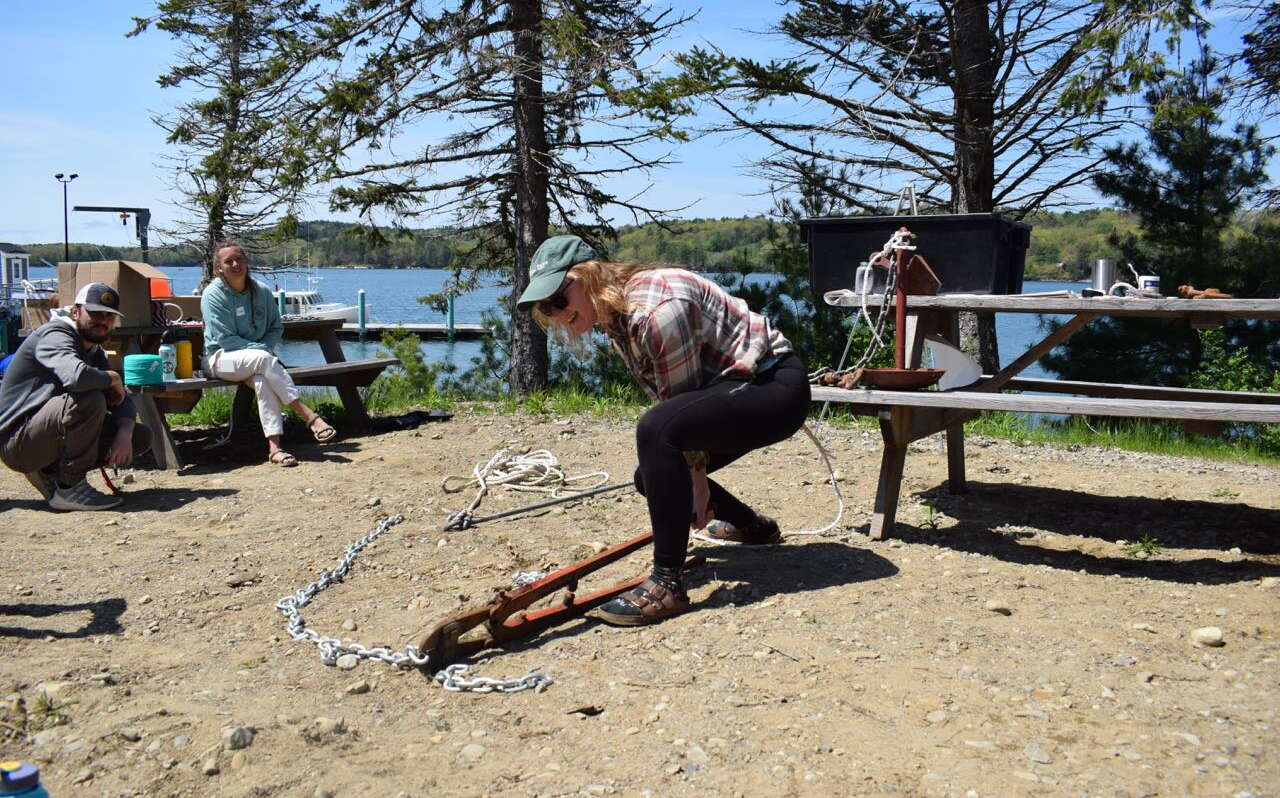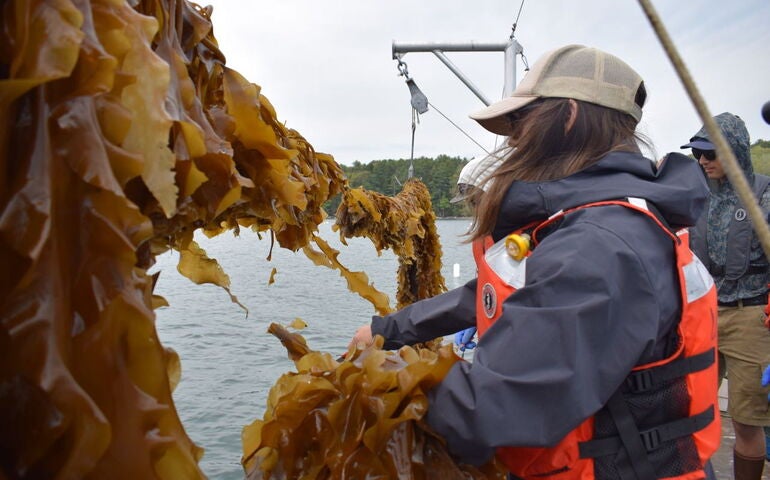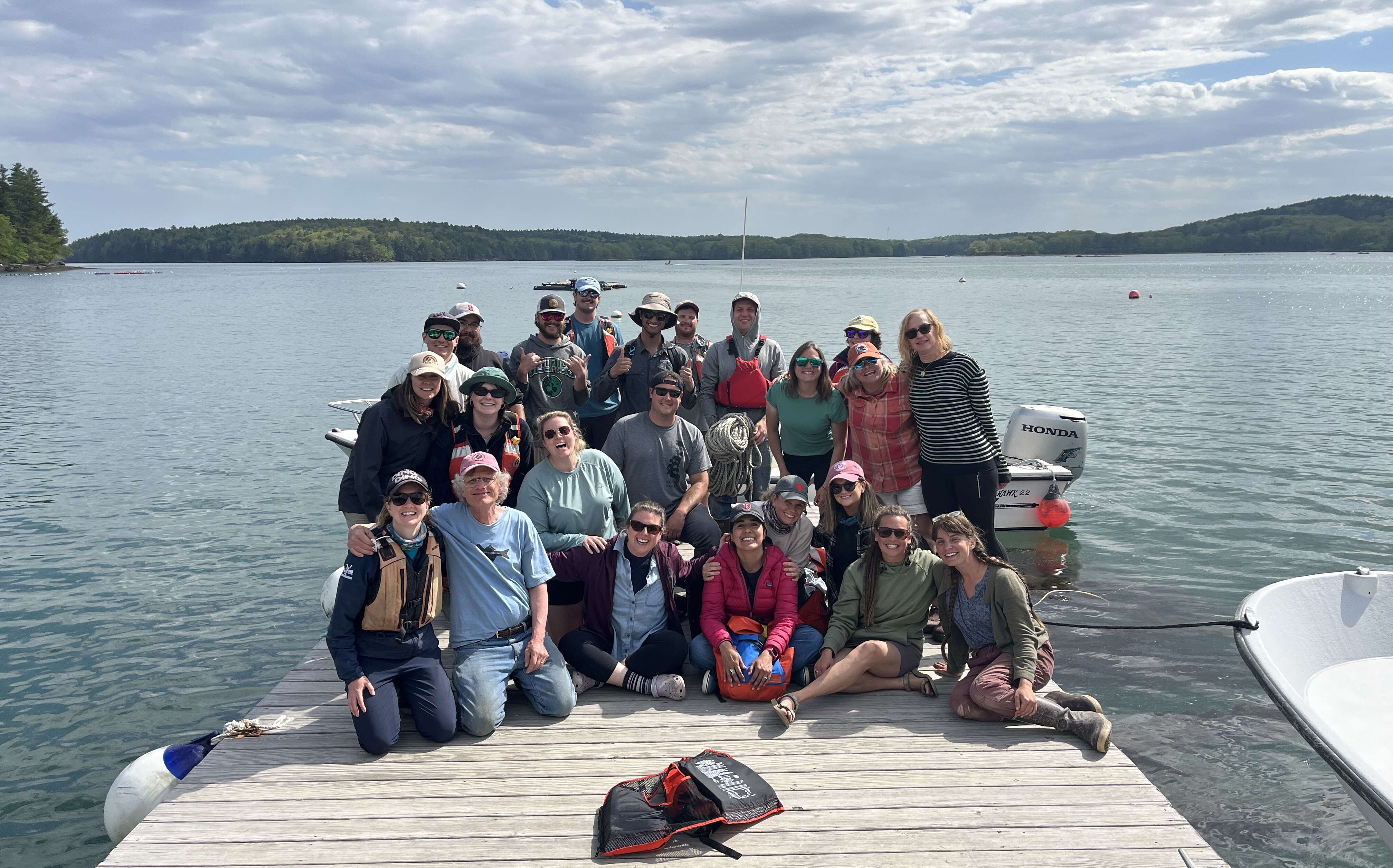
Aquaculture boot camp looks to fill gap in Maine's workforce development
 Photo / Courtesy, Aquaculture in Shared Waters
Students shown here are learning how to seed and harvest kelp lines.
Photo / Courtesy, Aquaculture in Shared Waters
Students shown here are learning how to seed and harvest kelp lines.
A five-day training program drew 22 participants looking to get hands-on experience in operating an aquaculture business.
The boot camp, hosted by the University of Maine’s Darling Marine Center in the Lincoln County coastal town of Walpole, was directed by Chris Davis, executive director of the Maine Aquaculture Innovation Center, a nonprofit supporting research and educational efforts in the industry; and Annie Fagan, a Maine Sea Grant marine extension associate.
The training, held May 20-24, grew out of feedback from the industry looking for more hands-on skill-building, said Fagan. The boot camp’s first cohort included new farm owners, farmhands, apprentices and students in other aquaculture workforce programs.
“We wanted to build community and give them resources and connection to the industry,” said Fagan.

The boot camp was designed to deliver essential skill-building training exercises to prepare new entrants to shellfish and kelp farming as practiced in Maine. The student cohort worked together in small groups and engaged in hands-on activities fundamental to working safely around the water.
The program was free of charge and included overnight accommodations at the Darling Marine Center for those unable to commute to the classes.
Topics included small vessel handling and maneuvering; knots, lines and splicing; mooring systems design and construction; shellfish gear construction; basic inshore navigation and rules of the road; an introduction to trailering; shellfish husbandry systems operation; seeding and harvesting of kelp lines; and engine and pump maintenance.
The program was hosted in partnership with Aquaculture in Shared Waters, which has helped people start and improve their aquaculture businesses in Maine since 2012, and Washington County Community College.
Aquaculture in Shared Waters has covered many of the topics through previous workshops in more of a presentation format. But this was the first time they were presented in an intensive, hands-on residential program.

“We get calls pretty regularly from people saying, ‘Hey, I’m starting a farm. Can you help me?’ Or, ‘I’m looking to start a farm. Where can I get more training?’” said Davis. “Everything from leasing and the regulatory side of things to the technology to the business side.”
All 22 students were Maine residents. The age range spanned several decades. Students came from as far as Kennebunkport and Lubec.
The program accommodated peer-to-peer co-teaching, allowing students to share their experiences and practices in the industry.
The industry network helped to get word out about the program.
“At this point the Shared Waters has a pretty deep alumni base,” said Davis.
The boot camp was supported by funding from NOAA Sea Grant through the Maine Aquaculture Hub, by the intramural research program of the U.S. Department of Agriculture, National Institute of Food and Agriculture and the U.S. Department of Education Office of Post Secondary Education.
Several organizations provided staff support and guest instructors, including Maine Sea Grant, Maine Aquaculture Innovation Center, the Aquaculture Research Institute at the University of Maine, the Carpenter’s Boat Shop and Pemaquid Oyster Co.
There’s increasing interest in getting involved in aquaculture.
“It’s like a chicken and egg situation: The programs are there to meet demand and that provides new ways for people to enter the industry,” said Fagan.
A typical day started at 8 a.m. with a meeting of the full cohort to cover different topics. The cohort was divided into smaller groups for hands-on trainings the rest of the day, followed by a debrief.
“It meant at times we had four separate courses going at the same time,” said Davis.
The boot camp attracted some participants of previous Shared Waters workshops. Fagan said she heard from one who participated in a Women in Aquaculture series and was at the boot camp with her partner.
“They said, ‘We’re going home this weekend to build our mooring system,’” Fagan said. “It was a cool example of: Here’s what you need to know and here you’re going to try it out for the first time and here’s this group of people you can reach out to.”
It’s too soon to say what the concrete outcomes are. But Fagan and Davis said they heard from students during the program and will be seeking further formalized feedback.
“The feedback has been so positive,” Fagan said. “It seems like this type of hands-on skill-building is really important to people.”










0 Comments